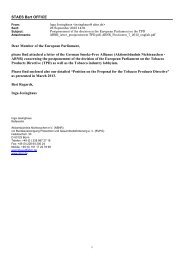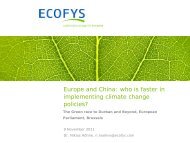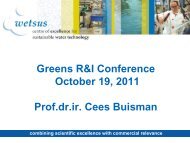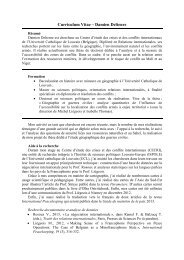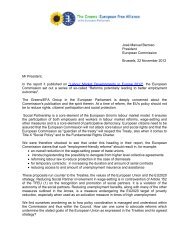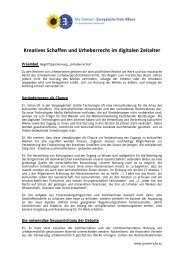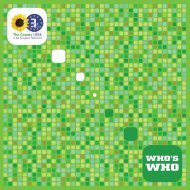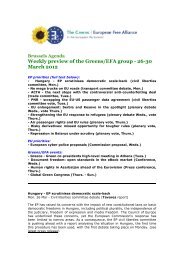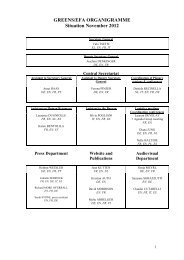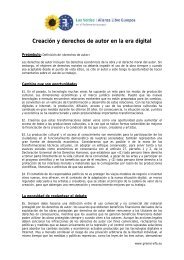Agro-Biotechnology: - The Greens | European Free Alliance
Agro-Biotechnology: - The Greens | European Free Alliance
Agro-Biotechnology: - The Greens | European Free Alliance
Create successful ePaper yourself
Turn your PDF publications into a flip-book with our unique Google optimized e-Paper software.
Framing legislation | Cloned farm animals - a ‚killing application‘? | 43<br />
before any decisions are taken. <strong>The</strong> EU Commission should have the courage<br />
to undertake non-discriminatory trade restrictions and not use the WTO 'chill<br />
effect' as an excuse for avoiding any regulation.<br />
Even if products are banned from the EU market, traceability has to be organised<br />
in international markets. Companies in the US have already developed<br />
a system of tracking cloned animals 51 . <strong>The</strong>se systems have to be expanded to<br />
the level of food production. Relevant genetic markers to identify products from<br />
cloned animals together with a system of comprehensive documentation and<br />
registration have to be implemented. Existing registers could, for instance, be<br />
expanded to include information on whether an animal was cloned or was the<br />
offspring of a cloned animal (Gunning et al., 2006). Several announcements<br />
have been made by companies such as ViaGen or TransOva saying they will<br />
establish mechanisms to track their animals use in farming 52 , and companies<br />
such as IndentiGen are able to provide DNA technologies for tracing meat from<br />
specific sources 53 .<br />
6.2.3 Patents<br />
EU Directive 98/44 does allow patents on animals and plants – a regulation<br />
which has been debated controversially for years. Political willingness within<br />
the EU to prohibit patents on animals and plants is increasing. <strong>The</strong> German<br />
government follows the political goal of avoiding patents on plants and animals<br />
in general 54 . Since new dependencies for farmers and adverse impacts on<br />
research and food security have to be expected if patents on seeds and farm<br />
animals are granted, patent law should be changed to define clear prohibitions<br />
concerning patents on genetic material from plants and animals.<br />
<strong>The</strong> current legislation might already allow patents on the process of cloning<br />
animals for food production to be ruled out in some cases. Article 6 of Directive<br />
98/44/EC prohibits patents on the process for modifying the genetic identity<br />
of animals in case it is likely to cause suffering without substantial medical<br />
benefit. Since medical benefits can not be expected from animals cloned for<br />
food production, and the suffering of animals caused by SCNT cannot be denied,<br />
patents might be challenged. In cases where patents cover both – medical<br />
and farm purposes – a disclaimer could be introduced to exclude patents for<br />
cloning of animals for food production.<br />
51 See for example: http://www.medscape.com/viewarticle/570297<br />
52 Cloning Companies Promise to Track <strong>The</strong>ir Animals, 20 December 2007m http://www.wired.com/<br />
wiredscience/2007/12/cloning-compani/<br />
53 http://www.identigen.com/<br />
54 Aigner fordert Änderung des europäischen Biopatentrechts, 10 Juni 2009 http://www.bmelv.de/<br />
SharedDocs/Pressemitteilungen/2009/120-AI-Biopatente.html



